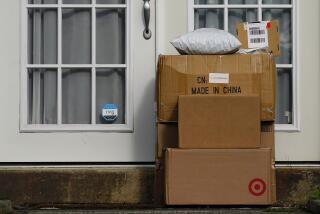Q&A: A stolen lockbox can create liability for homeowner association directors
- Share via
Question: Our condominium development of more than 90 units fronts a busy public street. It has an unmanned, gated and locked main entrance, and every owner has an entry key. There was one “lockbox” permanently located just outside this main entry gate attached to the fence surrounding the complex. For the 10 years I’ve lived here, real estate agents have kept keys for the main entry gate and for units that are listed for sale in that outside lockbox. Three months ago someone cut the lockbox away from the fence, stole it and all the keys that were inside. The board did not mention this at board meetings and owners were not informed of this theft, nor were we warned to take precautions.
I learned about the theft after speaking with a real estate agent who also told me the board decided not to change the main entry gate lock and keys. Owners are at the mercy of board decisions like these and when directors are confronted, they say “live with it.” Since the theft of the gate keys, there are many new people milling about our complex and no one knows who they are. One of the empty units for sale has become a revolving door for different people who appear to come and go at all hours. No one on our board or in the association wants to confront this issue. What can we do about this?
Answer: Allowing a lockbox for keys to be placed on the association’s unsecured property creates a liability for all owners. Homeowner associations should have security procedures in place for association property such as lockboxes. It should also have a procedure detailing chain-of-custody protocol so that its property can be tracked and accessed at any time. Many problems leading to litigation in such communities happen because there is no permanent central control system in place.
Association directors are obligated to inspect, manage and safeguard property, and titleholders have a right to inspect documents to ensure the board complies, according to Corporations Code sections 8330, 8333 and 8334 and Civil Code sections 5200 and 5210. The board should ask itself why keys to its development were mounted on an outside fence inviting peril, and why strangers are allowed to access the development and occupy empty units, jeopardizing everyone’s safety. Should any residents suffer harm within the development because of the association’s failure to take necessary precautions, residents may look to board directors who made the bad decision to personally reimburse them for damages they suffer.
A board director cannot delegate his or her fiduciary duties to a third party, including management. Those duties entail taking reasonable precautions to protect all association and titleholder property within the common interest development. This includes implementing security measures such as regularly replacing or installing gate locks and keys and protecting gated entries from vandalism and unauthorized entry.
Other problems occur when boards fail to obtain written assurances for confidentiality and safekeeping of association property from vendors such as management companies and real estate agents. Association property also includes files, information, Internet activity and even electronic data.
Association security procedures should detail how and when owners are to be notified in the event of a breach of security and where owners can report suspicious activity.
Homeowners cannot be expected to merely “live with” board inaction or bad decisions and should utilize their own inspection rights on a regular basis. Owners should take all legally acceptable steps toward protecting themselves from exposure to crime within the development. If a board has no rules or procedures in place regarding security and safekeeping of association property and of its residents, it should make them now. Vendors who fail to abide by those rules should not be doing business at your development.
Zachary Levine, a partner at Wolk & Levine, a business and intellectual property law firm, co-wrote this column. Vanitzian is an arbitrator and mediator. Send questions to Donie Vanitzian, JD, P.O. Box 10490, Marina del Rey, CA 90295 ornoexit@mindspring.com
More to Read
Inside the business of entertainment
The Wide Shot brings you news, analysis and insights on everything from streaming wars to production — and what it all means for the future.
You may occasionally receive promotional content from the Los Angeles Times.









